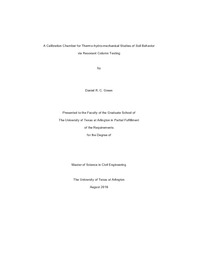
ATTENTION: The works hosted here are being migrated to a new repository that will consolidate resources, improve discoverability, and better show UTA's research impact on the global community. We will update authors as the migration progresses. Please see MavMatrix for more information.
Show simple item record
| dc.contributor.advisor | Hoyos, Laureano | |
| dc.creator | Green, Daniel R. C. | |
| dc.date.accessioned | 2018-11-12T18:47:54Z | |
| dc.date.available | 2018-11-12T18:47:54Z | |
| dc.date.created | 2018-08 | |
| dc.date.issued | 2018-08-09 | |
| dc.date.submitted | August 2018 | |
| dc.identifier.uri | http://hdl.handle.net/10106/27594 | |
| dc.description.abstract | Abstract
A Calibration Chamber for Thermo-hydro-mechanical Studies of Soil Behavior
via Resonant Column Testing
Daniel R. C. Green
The University of Texas at Arlington, 2018
Supervising Professor: Dr. Laureano Hoyos
A considerable portion of the emerging geothermal infrastructure in the country is located in earthquake prone areas while being supported and/or surrounded by soil deposits located well above the groundwater table. Geotechnical earthquake research in the country, however, continues to be mostly focused on soil response under saturated conditions, especially soil liquefaction phenomena, while most of the work on dynamic response of compacted soils has not taken suction or thermal conditioning of pore-fluids into account as critical environmental factors. To date, there is hardly any comprehensive study at the laboratory scale that has focused on a thorough assessment of the dynamic properties of unsaturated soils, particularly material damping ratio, for a relatively large range of cyclic shear strain amplitudes (0.001% to 0.1% shear strain amplitudes) under controlled moisture and simultaneous thermal conditioning of pore-fluids.
An existing Resonant Column apparatus has been upgraded to investigate the dynamic response of compacted low plasticity clay, particularly in terms of shear-wave velocity, shear modulus and damping ratio, under controlled moisture, confinement, and thermal conditioning of the pore-fluids, from 20-60°C. A digital convection heater, featuring two heating elements, two internal fans, and a thermocouple, has been adapted to the main cell of the RC apparatus for measurement and control of thermal conditioning of the pore-fluids. However, because thermocouple probes cannot be inserted into the sample during testing for risk of disturbing the compacted soil and puncturing the latex membrane, a thorough thermo calibration of the Resonant Column chamber is necessary prior to testing to ensure proper heating and heat distribution within the soil.
For calibration, a second heating chamber, similar to the one used for RC testing was developed to determine optimum temperatures and heating times for the soil to reach a desired temperature. The primary scope of this thesis is the thermo calibration of the Resonant Column chamber and preliminary thermo-controlled RC testing to investigate the potential impact of heat on stiffness parameters, particularly shear modulus and damping ratio of a low plasticity clay. | |
| dc.format.mimetype | application/pdf | |
| dc.language.iso | en_US | |
| dc.subject | Resonant column | |
| dc.subject | Calibration | |
| dc.title | A Calibration Chamber for Thermo-hydro-mechanical Studies of Soil Behavior via Resonant Column Testing | |
| dc.type | Thesis | |
| dc.degree.department | Civil Engineering | |
| dc.degree.name | Master of Science in Civil Engineering | |
| dc.date.updated | 2018-11-12T18:47:54Z | |
| thesis.degree.department | Civil Engineering | |
| thesis.degree.grantor | The University of Texas at Arlington | |
| thesis.degree.level | Masters | |
| thesis.degree.name | Master of Science in Civil Engineering | |
| dc.type.material | text | |
Files in this item
- Name:
- GREEN-THESIS-2018.pdf
- Size:
- 4.653Mb
- Format:
- PDF
This item appears in the following Collection(s)
Show simple item record


